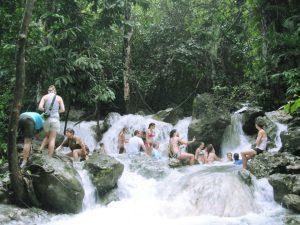Lauren Hamlin
The Broadside
Summertime means trips to exotic places, meeting new people, having fun, learning something new and taking a break from school. For 14 college students, it’s all of those except for the break from school.
This summer, students from several different colleges will travel to Costa Rica and spend four weeks studying and learn Spanish and Field Biology/Ecology as part of the Study Abroad program.
Study Abroad is put on by the Oregon International Education Consortium, an organization consisting of Central Oregon Community College, Chemeketa CC, Clackamas CC, Mount Hood CC, Portland CC, Rogue CC and Southwestern CC. OIEC puts on several different Study Abroad programs throughout the year.
Greg Lyons, OIEC’s statewide coordinator recently visited Costa Rica in preparation for the summer trip. He visited the same Biology and Ecology stations the students will be visiting for their studies.
“It’s pretty fascinating because when you get out to the jungle, you can see everything that is being explained in the books,” said Lyons. “It’s better than just reading about it because it’s hands-on.”
Students will spend the first week at the Ecolodge San Luis, a learning and research facility and University of Georgia branch campus, where they will study tropical ecology. The following two weeks will be spent in Alajuela where they will stay with their host family.
“The host families are really nice and accommodating,” said Lyons.
During these two weeks, students’ focuses include studying Spanish, taking biology classes, exploring the local Wildlife Conservation Park and touring INBioparque, a research center showing the flora and fauna of the region’s ecosystems. Students spend about 4-5 hours per day at the study stations and spend some of the weekend days on field trips.
“Students have the afternoons off,” said Lyons. “If the students are open to interacting a lot with the host families, they can learn a lot about the language, the customs and the history.”
The final week will be spent doing Field Biology tours where they will visit the Palo Verde Field Station, a Tropical Studies research and teaching site. Students will also visit the La Selva Reserve in Puerto Viejo de Sarapiqui.
Students going to Costa Rica will earn four credits of Spanish at the level they test into and will earn four credits in Tropical Field Ecology.
This study abroad is open to all students with an interest in learning about the tropical ecosystems of Costa Rica. Students wanting to do a Study Abroad are encouraged to apply for the Gilman International Scholarship Program, which is federally funded.
“We’ve had several students who have gotten that scholarship. Students can receive up to $5,000.” said Lyons. “One student from Chemekata applied for the scholarship and received $3,000, so she only has to pay $700 for the trip (not including tuition).”
The Gilman Scholarship is based on semester terms, so students need to apply in advance. Cost of the Costa Rica trip, including airfare, is $3,700, a seemingly high cost but according to instructors, it’s well worth it.
“Study Abroad really is a life-changing opportunity,” said Jon Bouknight, COCC’s professor of communication and the OIEC representative. “I’m all for studying the traditional ‘boring’ classes, my boring classes, but if the student is interested in a particular location, and they’re willing to scrape together the money, it’s an experience they won’t ever forget.”
For more information on COCC’s Study Abroad programs or to find out about how you can go to Costa Rica next year, contact Greg Lyons at [email protected] or Jon Bouknight at [email protected].
(Contact: [email protected])









how to japanes | Nov 6, 2013 at 10:59 am
Honestly Really Terrific. Thanks a lot!!!
how to japanes | Nov 6, 2013 at 10:59 am
Honestly Really Terrific. Thanks a lot!!!